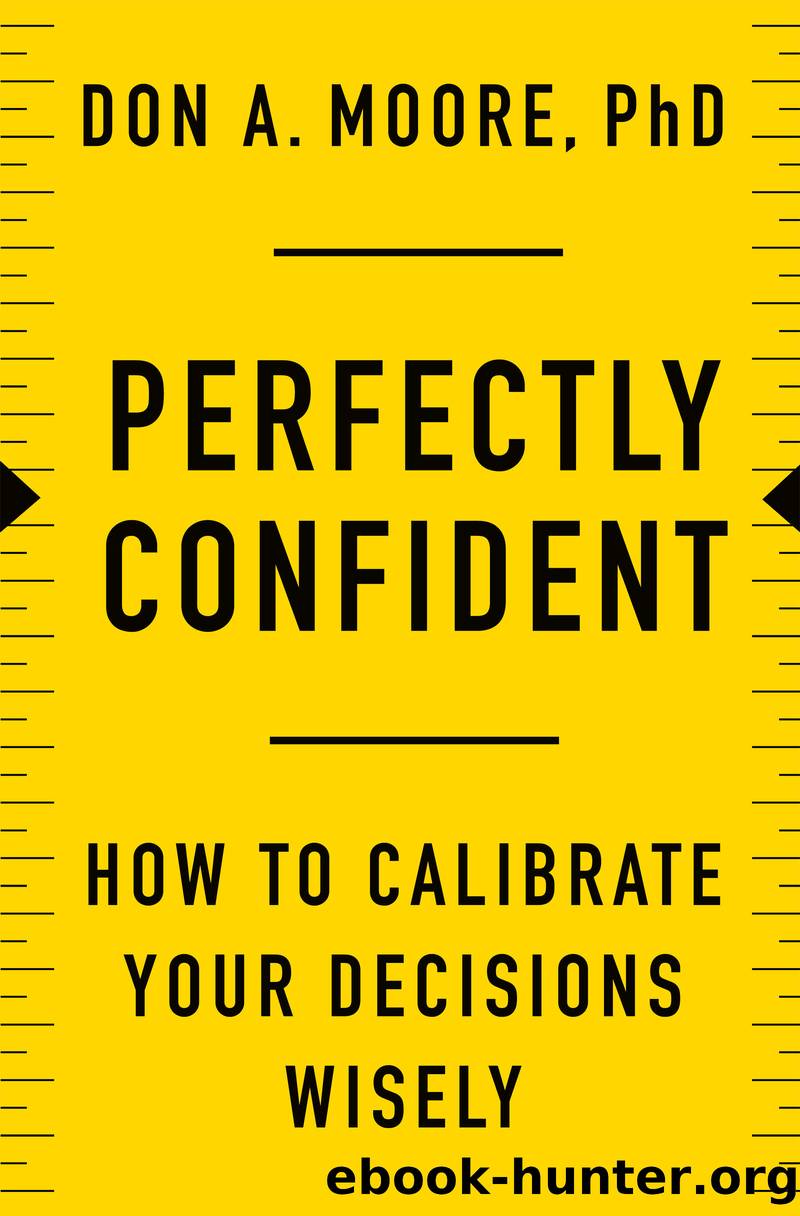Perfectly Confident by Don A. Moore

Author:Don A. Moore
Language: eng
Format: epub
Publisher: HarperCollins
Published: 2020-03-17T00:00:00+00:00
DISASTER PREPAREDNESS
Anticipating disaster so as to avoid it is a celebrated psychological strategy. Julie Norem calls it defensive pessimism. Defensive pessimists focus on the risks of failure to motivate themselves to avoid those risks. I suspect that many of the best students in my classes drive themselves with defensive pessimism. Before every exam, they vividly imagine failure. They anticipate their guilt at having disappointed their teachers, their parents, and themselves. This fear motivates them to work harder and thereby increases the chances that they will, in fact, do well.
Often, the hardest workers are motivated by the potential guilt they envision. They show up and pick up the slack left by others, fearing that failure to do so would leave them feeling even worse. Defensive pessimism is a personal form of premortem. Thinking ahead with defensive pessimism can inoculate individuals against predictable misfortunes. Teams and organizations use planning meetings at which the group explicitly considers the possibility of failure, maybe by asking questions such as those Klein and Kahneman recommend: “What are the most likely reasons we will fail?” “What can we do to mitigate those risks and increase our decision’s expected value?” Vividly imagining the possibility of failure—alone and together—is crucial for figuring out how to avoid it.
Charlie Munger, Warren Buffett’s longtime business partner, noted the value of both considering the opposite and disaster preparedness when he described his investing strategy: “Invert, always invert: Turn a situation or problem upside down. Look at it backward. What happens if all our plans go wrong? Where don’t we want to go, and how do you get there? Instead of looking for success, make a list of how to fail instead—through sloth, envy, resentment, self-pity, entitlement, all the mental habits of self-defeat. Avoid these qualities and you will succeed. Tell me where I’m going to die so I don’t go there.”
As with premortems, disaster preparation invites organizations to anticipate calamities, both natural and man-made, and plan for them. Ian Mitroff, one of the fathers of modern crisis management, studied engineering but went on to advise companies on disaster preparedness. Mitroff warns that the main impediment to adequate preparation is wishful thinking. The reluctance to invest in disaster preparedness is based on the optimistic belief that “it can’t happen to us.” Mitroff’s work builds on that of the sociologist Charles Perrow, whose research explores the risks of living with modern technologies. Nuclear power plants, air travel, and artificial intelligence have multiplied human influence. Our toolmaking ingenuity allows us to accomplish much, but that power increases the risk when things go wrong.
Many companies and governments have taken Mitroff’s advice to heart. They conduct drills that test the resilience of their systems to possible disaster. My hometown of Berkeley, California, is vulnerable to earthquakes, and so the city takes part in the Great California ShakeOut, in which millions of people practice what they will do when the Big One hits. Facebook created a team named Project Storm whose job it is to plan for natural disasters that could disable the company’s computer installations around the world.
Download
This site does not store any files on its server. We only index and link to content provided by other sites. Please contact the content providers to delete copyright contents if any and email us, we'll remove relevant links or contents immediately.
| Ethics | Etiquette |
| Fashion & Image | Health & Stress |
| Motivation & Self-Improvement | Work Life Balance |
| Workplace Culture |
Tools of Titans by Timothy Ferriss(6938)
Change Your Questions, Change Your Life by Marilee Adams(6637)
Deep Work by Cal Newport(5452)
Man-made Catastrophes and Risk Information Concealment by Dmitry Chernov & Didier Sornette(4730)
Big Magic: Creative Living Beyond Fear by Elizabeth Gilbert(4719)
The Slight Edge by Jeff Olson(4716)
The Motivation Myth by Jeff Haden(4521)
Digital Minimalism by Cal Newport;(4512)
Stone's Rules by Roger Stone(4413)
Ego Is the Enemy by Ryan Holiday(3982)
The Laws of Human Nature by Robert Greene(3936)
Tuesdays with Morrie by Mitch Albom(3830)
Rising Strong by Brene Brown(3777)
Eat That Frog! by Brian Tracy(3509)
Skin in the Game by Nassim Nicholas Taleb(3456)
The Money Culture by Michael Lewis(3277)
Skin in the Game: Hidden Asymmetries in Daily Life by Nassim Nicholas Taleb(3259)
Believe It to Achieve It by Brian Tracy & Christina Stein(3201)
Bullshit Jobs by David Graeber(3173)
